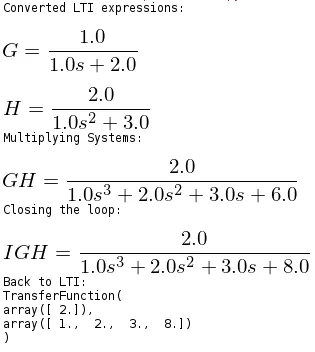根据您对“易用”的定义,您应该考虑从
lti派生自己的类,并在传递函数上实现必要的代数运算。这可能是最优雅的方法。
以下是我的观点:
from __future__ import division
from scipy.signal.ltisys import TransferFunction as TransFun
from numpy import polymul,polyadd
class ltimul(TransFun):
def __neg__(self):
return ltimul(-self.num,self.den)
def __floordiv__(self,other):
return NotImplemented
def __mul__(self,other):
if type(other) in [int, float]:
return ltimul(self.num*other,self.den)
elif type(other) in [TransFun, ltimul]:
numer = polymul(self.num,other.num)
denom = polymul(self.den,other.den)
return ltimul(numer,denom)
def __truediv__(self,other):
if type(other) in [int, float]:
return ltimul(self.num,self.den*other)
if type(other) in [TransFun, ltimul]:
numer = polymul(self.num,other.den)
denom = polymul(self.den,other.num)
return ltimul(numer,denom)
def __rtruediv__(self,other):
if type(other) in [int, float]:
return ltimul(other*self.den,self.num)
if type(other) in [TransFun, ltimul]:
numer = polymul(self.den,other.num)
denom = polymul(self.num,other.den)
return ltimul(numer,denom)
def __add__(self,other):
if type(other) in [int, float]:
return ltimul(polyadd(self.num,self.den*other),self.den)
if type(other) in [TransFun, type(self)]:
numer = polyadd(polymul(self.num,other.den),polymul(self.den,other.num))
denom = polymul(self.den,other.den)
return ltimul(numer,denom)
def __sub__(self,other):
if type(other) in [int, float]:
return ltimul(polyadd(self.num,-self.den*other),self.den)
if type(other) in [TransFun, type(self)]:
numer = polyadd(polymul(self.num,other.den),-polymul(self.den,other.num))
denom = polymul(self.den,other.den)
return ltimul(numer,denom)
def __rsub__(self,other):
if type(other) in [int, float]:
return ltimul(polyadd(-self.num,self.den*other),self.den)
if type(other) in [TransFun, type(self)]:
numer = polyadd(polymul(other.num,self.den),-polymul(other.den,self.num))
denom = polymul(self.den,other.den)
return ltimul(numer,denom)
__rmul__ = __mul__
__radd__ = __add__
这里定义了一个名为
ltimul的类,它包含了
lti加上加法、乘法、除法、减法和取反运算;对于整数和浮点数也定义了二元运算。我已经针对Dietrich的例子进行了测试,详情请参见
此处。
G_s = ltimul([1], [1, 2])
H_s = ltimul([2], [1, 0, 3])
print(G_s*H_s)
print(G_s*H_s/(1+G_s*H_s))
当GH恰好等于
ltimul(
array([ 2.]),
array([ 1., 2., 3., 6.])
)
最终的 GH/(1+GH) 结果并不太好看:
ltimul(
array([ 2., 4., 6., 12.]),
array([ 1., 4., 10., 26., 37., 42., 48.])
)
由于我对转移函数不是很熟悉,所以我不确定这是否会得到与基于sympy的解决方案相同的结果,因为此方法可能缺少一些简化。我觉得已经有点奇怪了,即使我想这个函数是常量1,但lti([1,2],[1,2])并没有简化它的参数。因此,我宁愿不猜测最终结果的正确性。
无论如何,主要信息是继承本身,因此上述实现中可能存在的错误希望只会造成小的不便。我对类定义也不太熟悉,因此上述实现可能并未遵循最佳实践。
在@ochurlaud指出我的原始代码仅适用于Python 2后,我最终进行了重写。原因是在Python 2中,/操作由__div__/__rdiv__实现(是模糊的"classical division")。然而,在Python 3中,存在/(真正的除法)和//(地板除法)之间的区别,它们分别调用__truediv__和__floordiv__(以及它们各自的“右”对应项)。上述代码行中第一个__future__导入触发了适当的Python 3行为,即使在Python 2上也是如此,因此上述工作适用于两个Python版本。由于地板(整数)除法对我们的类没有多大意义,因此我们明确表示它不能处理//(除非另一个操作数实现了它)。
还可以轻松定义相应的__iadd__、__idiv__等就地操作,例如+=、/=等。

__div__运算符无效。改为__truediv__解决了问题(对于__rdiv__也是如此)。结合两个答案可以得到一个非常好的子类...我希望它已经在scipy中了... - ochurlaud